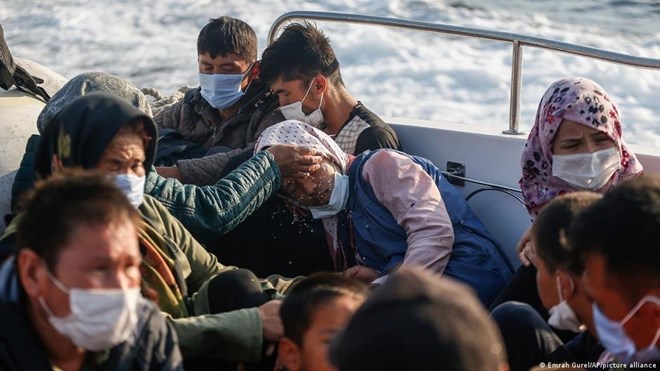
Friday May 26, 2023

Greece has been accused of pushing back refugees trying to cross the Aegean Sea from Turkey | Photo: Emrah Gurel/AP/picture alliance
Greece has been accused of pushing back refugees by allegedly abandoning them at sea, leaving them for Turkish authorities to deport them back to Turkey.
Kyriakos Mitsotakis, Greece’s outgoing prime minister, has ordered a probe into a report that authorities illegally deported a group of migrants who had reached an eastern Aegean island from Turkey.
The call for the investigation comes after a New York Times report showed video footage from early April of 12 migrants -- men, women, children, and an infant -- locked inside an unmarked van and forced into a speedboat on the Greek island of Lesbos before being transferred to a Greek Coast Guard vessel.
From there, the migrants were allegedly abandoned at sea for Turkish authorities to later pick up and bring to a detention center in the city of Izmir.
In an interview with CNN late Tuesday (23 May), Mitsotakis said, “It is already being investigated (by) my government. I have made numerous times the distinction between (the reported pushback), which is a completely unacceptable practice, and between our obligation, which is ... intercepting (migrants) on our sea border with Turkey and then asking for the Turkish coast guard to come and pick these people up.”
Collective and illegal expulsions
The European Union’s top-ranking immigration official slammed Greece for the incident, calling it “absolutely unacceptable”.
"What seems to be in these videos is a deportation,” said EU Home Affairs Commissioner Ylva Johansson in an interview with POLITICO, adding that she had no reason to doubt the video footage.
Johansson said the EU has formally asked Athens to “fully and independently” investigate the incident, adding that the EU’s executive branch “stands ready to take formal steps, as appropriate.”
Pushbacksor the use of various State measures to force refugees and migrants out of their borders are illegal.
International laws and treaties such as the European Convention of Human Rights Protocol and the 1951 Refugee Convention prohibit collective expulsions and the return of anyone to a country where they could face serious human rights violations.
Jumping countries, fleeing war and repression
The New York Times acquired the damning video footage from Austrian aid worker Fayad Mulla, who has spent nearly three years documenting abuses against migrants.
The newspaper tracked down and interviewed 11 of the 12 asylum seekers in a detention center in Izmir, Turkey.
The asylum seekers, who were from Somalia, Eritrea, and Ethiopia, had been jumping from one country to another for years, trying to escape war in the Horn of Africa. All of those interviewed had been in Turkey for at least a year, scraping by to earn enough money to be smuggled into Europe.
One refugee said she and her older children fled to Yemen from Somalia, before it also became a war zone. Another had run to Ethiopia from Eritrea, but civil war eventually broke out there too.
Crackdown on immigration policies
Greece and the European Union have progressively tightened migration policies since 2015 when the arrival of refugees from Syria, Iraq, and other countries reached a record high of more than one million.
The steady stream of newcomers has reshaped European politics, igniting populist hard-right views against migrants and asylum seekers.
Countries like Poland, Italy, and Lithuania have recently changed their laws to make it easier to deport migrants and punish those who help them.
Last March, the European Commission urged EU countries to increase the deportation of failed asylum seekers, saying it was essential to manage orderly migration.